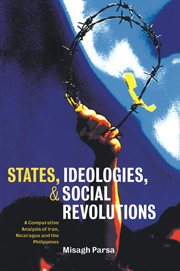 States, Ideologies, and Social Revolutions
States, Ideologies, and Social Revolutions Book contents
- Frontmatter
- Contents
- List of tables
- Preface
- Part I: Theory and structural background
- 1 Toward a theory of revolution: linking structure and process approaches
- 2 Conflict and the making of exclusive rule
- 3 State intervention and contradictions
- Part II: Mobilization and collective action
- Part III: Outcomes and conclusions
- Bibliography
- Index
2 - Conflict and the making of exclusive rule
Published online by Cambridge University Press: 22 September 2009
- Frontmatter
- Contents
- List of tables
- Preface
- Part I: Theory and structural background
- 1 Toward a theory of revolution: linking structure and process approaches
- 2 Conflict and the making of exclusive rule
- 3 State intervention and contradictions
- Part II: Mobilization and collective action
- Part III: Outcomes and conclusions
- Bibliography
- Index
Summary
In chapter 1, discussion focused on the varying degrees to which certain states were rendered structurally vulnerable to conflict and challenge. States in Iran, Nicaragua, and the Philippines shared many of those traits. These regimes had emerged or solidified their power during earlier rounds of social and political conflicts that were largely nationalist in nature. During these conflicts alternative challengers had arisen and gained the support of some segments of the population, who mobilized and demanded certain changes. All three regimes succeeded in eliminating or weakening these challengers and repressing their supporters. Following the repression, all three regimes increasingly centralized their power structure and constructed polities that excluded broad segments of the population, including segments of the privileged classes. The regimes also eliminated or weakened formal democratic institutions and political parties. Thus, the three powerholders rendered elections and democratic procedures irrelevant. Once secure after the power struggle, these states were free to pursue policies likely to undermine the power and at times the privilege of at least segments of the upper classes and groups that had previously been part of the polity. As a result, the rulers were not accountable to any internal social or political forces. Under these conditions, the regimes in Iran and Nicaragua built dynasties that lasted for several decades. Although Marcos could not construct a dynasty in the Philippines, he managed to stay in power long after his two presidential terms had expired.
- Type
- Chapter
- Information
- States, Ideologies, and Social RevolutionsA Comparative Analysis of Iran, Nicaragua, and the Philippines, pp. 29 - 54Publisher: Cambridge University PressPrint publication year: 2000


